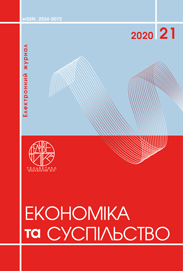THE TAX SYSTEM OF UKRAINE: THE FORMATION OF THE NATIONAL MODEL «HOMO FISCALUS» IN CONDITIONS OF UNCERTAINTY
Abstract
Taxes are an element of the relationship between the state and the model «homo economicus». This model was formed before the beginning of the XX century and its characteristic features are selfishness and rationality in maximizing profits. The «homo economicus» model is the anti taxpayer model. The tax was considered as a burden from which to avoid as much as possible. However, the political, social, and economic changes of the beginning of the XX century influenced the change of the model «homo economicus». The taxpayer began to be actively investigated by representatives of various economic schools, in particular Keynesianism and institutionalism. The institutional theory (traditional institutionalism and neoinstitutionalism) occupies a special place in the study of taxes as a formal institution of interaction between the state and economic entities. Representatives of institutional theory for the first time began to investigate a taxpayer with widespread use of psychology, sociology. Revolutionary events, the first and second world wars, the emergence of new countries in Europe have changed the features of the model «homo economicus» and economic functions of the state. There are new models of behavior of the economic agent – «Homo reciprocans», «Nomo sovieticus», «Socio-economicus». A special place in the study of the essence of taxes and the relationship with «homo economicus» is the neoinstitutionalism. Within the limits of this direction the contract basis of modern economic and tax relations is investigated. Taxes serve as a contractual relationship between the state and the taxpayer. However, tax motivation is based on tax trust. Tax trust and trust in general are the subject of research of traditional institutionalism. Tax trust is an informal institution that is formed for a long time. The experience of European countries shows that this informal institution became the key to motivating taxpayers. The taxpayer through trust creates a new rational attitude to taxes. Modern taxes are both a form of social contract and the rule of the state. Violation of the contract leads to a tax uncertainty about potential tax rates, an increase in administration costs for control. The Ukrainian economic system is in a period of stagnation and at the same time a significant level of the shadow economy. Such a situation requires maximum confidence among economic actors and the state through a system of formal and informal institutions.
References
Глущак А.С. Раціональне та ірраціональне в структурі філософського дискурсу. Філософські обрії, 2009. № 21. С. 29–45.
Дементьєв В. Сучасна теорія інститутів: ідентифікація предметного поля // Економічна теорія. – 2015. № 3. С. 26–50.
Єрмоленко A.M. Комунікативна практична філософія. Підручник. К.: Лібра. 1999, 488 с.
Соціально-економічні інституції економічної системи України: монографія / За заг. ред. проф. К.С. Солонінка. Житомир: ЖДТУ, 2011. 232 с.
Уильямсон О. Экономические институты капитализма. Фирмы, рынки, отношенческая контрактация. Научное редактирование и вступительная статья к. э. н. В.С. Катькало; пер. с англ. СПб. : Лениздат ; SEV Press, 1996. 702 с.
Peter Weise. Homo economicus und homo sociologicus: Die Schreckensmänner der Socialwissenschaften // Zeitschrift für Sociologie. April 1989, Jg.18, H. 2, S. 148–161
Toffler A. Future shock / A. Toffler – New York: Random House, 1970. 505 p.
J.R. Commons. Institutional Economics. // The American Economic Review, Vol. 21, Dec. 1931. p. 649–650.
Trivers, R.L., The Evolution of Reciprocal Altruism, Quarterly Review of Biology 46 (1971): 35–57.
Cambra, Fernando P. de. Homo sovieticus. La vida actual en Rusia. – Barcelona: Ediciones Petronio, 1975. 296 p.
Glushchak A.С. Rational and irrational in the structure of philosophical discourse. Philosophical horizons, 2009. No. 21. p. 29–45.
Dementiev V. Modern theory of institutes: identification of the subject field // Economic Theory. 2015. No. 3. p. 26–50.
Yermolenko A.M. Communicative Practical Philosophy. Textbook. K.: Libra. 488 s. 1999.
Socio-economic institutions of the economic system of Ukraine: monograph / According to the commissions. edit prof. K. S. Soloninka. Zhytomyr: ZHDTU, 2011. 232 p.
Williamson O. The Economic Institutes of Capitalism. Firms, markets, relative contraction. Scientific editing and introductory article by K. N. V. S. Katkalo; per. from english – St. Petersburg : Lenizdat; SEV Press, 1996. 702 pp.
Peter Weise. Homo economicus und homo sociologicus: Die Schreckensmänner der Socialwissenschaften // Zeitschrift für Sociologie. April 1989, Jg.18, H. 2, S. 148–161.
Toffler A. Future shock / A. Toffler – New York: Random House, 1970. 505 p.
J.R. Commons. Institutional Economics. // The American Economic Review, Vol. 21, Dec. 1931. p. 649–650.
Trivers, R.L., The Evolution of Reciprocal Altruism, «Quarterly Review of Biology» 46 (1971): 35–57.
Cambra, Fernando P. de. Homo sovieticus. La vida actual en Rusia. – Barcelona : Ediciones Petronio, 1975. 296 p.


